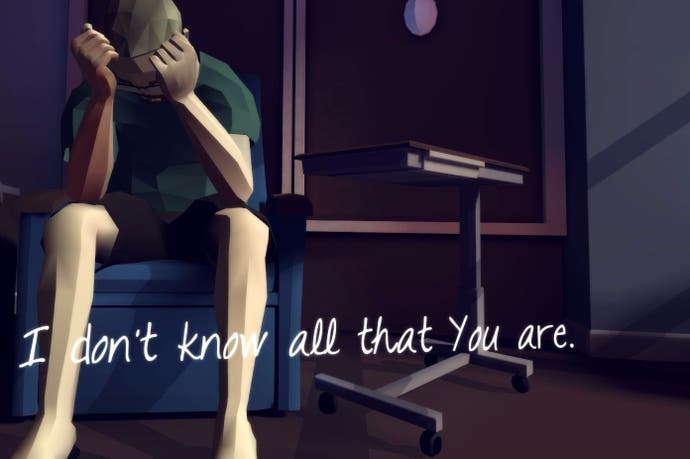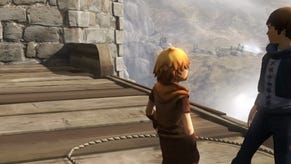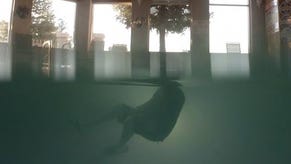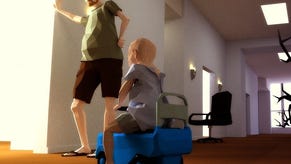That Dragon, Cancer review
On hospital time.
You can't save him. If your idea of a video game is a world to be conquered or a puzzle to be solved, then That Dragon, Cancer, the autobiographical game from Ryan and Amy Green about their terminally ill child Joel, can come as a melancholy shock. It's not something that can be won or, in that particularly crass term, beaten; it is instead a tour through the lives of a family touched by the shadow of cancer that can be testing and trying in a way unlike many other video games before it.
Told in 14 short episodes, That Dragon, Cancer is a necessarily personal game: a diary of faith, hope and grief as Joel's illness progresses over four years that are flicked through across some two hours. Seeing a family tragedy unfold from such an intimate perspective could have been uneasily voyeuristic, but there's a warmth to That Dragon, Cancer that gently ushers you in. In its more grounded moments, That Dragon, Cancer speaks to the universal experience of seeing a loved one taken ill, and of trying to come to terms with the impending loss.
You'll see it in the exacting, almost painful detail of the hospital room where you occasionally sit, helpless, with Joel: a cramped chamber muted by time, its flat blues and greens touched by indifferent light, a cheap vinyl chair against one wall and a small sofa against another on which to catch an hour's stolen sleep. That Dragon, Cancer takes that space and folds it inwards, claustrophobia giving way to numb disassociation and then on to something else. If video games excel at telling stories through the exploration of space, then this is one of their triumphs - a place that's all the more touching for its authenticity.
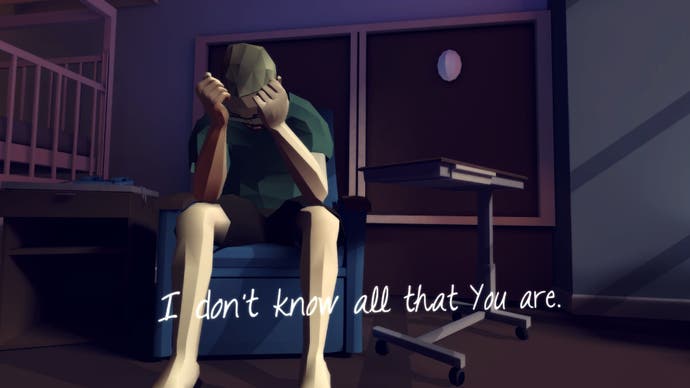
It's that authenticity, that unvarnished honesty, that can give That Dragon, Cancer a gut-punching weight. A scene in another hospital room, with its own more comfortable furniture and starkly-lit walls, sees the delivery of a bleak diagnosis as Ryan and Amy take on the news while Joel sits unaware at the centre of it all, fixated with a talking toy. Through that toy's simple mechanisms you can rewind the scene and see it from four different perspectives, from the pragmatism of the doctor to the brief vanity of Ryan: "They'll be impressed with the way we handle all of this," he thinks to himself, "such good, thoughtful parents that ask such good questions."
It's one of the few times you're given agency in a game that's otherwise about slowly clicking through scenes, observing what's before you. The quiet can be absorbing; at one point, you're free to walk the corridors of the hospital, taking in the artwork created by its patients, a gallery of hope and longing sketched out in crayon and captured in loving family photographs.
That Dragon, Cancer is, nominally, a point-and-click adventure, though there are no puzzles to solve as such. The closest it gets is in the incessant beeping of machinery in Joel's room that you tap away at in order to silence, grasping for some short peace. Progress comes by way of seeing through each scene to unlock another, or by finding a phone that carries a voicemail from Ryan's wife Amy that segues into what's next. The phone becomes a poignant item: a passageway from the hospital corridors to the outside world, and a sole point of connection in the painful isolation of a small ward.
It's where the relationship between Ryan and Amy, tested by their ordeal, comes into focus: Ryan falling back on his strong fatherly instinct, Amy full of optimism that's understandable if sometimes painfully naïve. It's Amy, too, who more often taps into the well of spirituality that helps see the Greens through their darkest moments, casting some light where others might see just despair. The faith that helps bind this family together gives That Dragon, Cancer its own stream of optimism: this is a game that's full of hope and of love, a celebration of Joel, rather than anything overly mournful.
Sadly, it can also let sentimentality get the better of it. In the game's final moments, mawkishness washes in, leaving a saccharine aftertaste, while That Dragon, Cancer's moments of powerful truth are often undone by cumbersome flights of fancy. At one point, a hospital room fills with heart-shaped balloons, and you're ushered into a clumsy mini-game where Joel, clutching onto these awkward symbols, must navigate through clouds of cancer cells. At another, after quietly contemplating the gallery of touchingly authentic artwork, you're placed in a Mario Kart-esque race around the corridors of the hospital, collecting pick-ups which are then revealed to be the litany of drugs and tools used in Joel's treatment.
These banal interjections suggest That Dragon, Cancer can't quite move away from traditional game forms, and they detract from the truthfulness of its more domestic moments. They can't detract, though, from the touching humanity of a work that bravely pushes at the boundaries of what's possible within a game.
